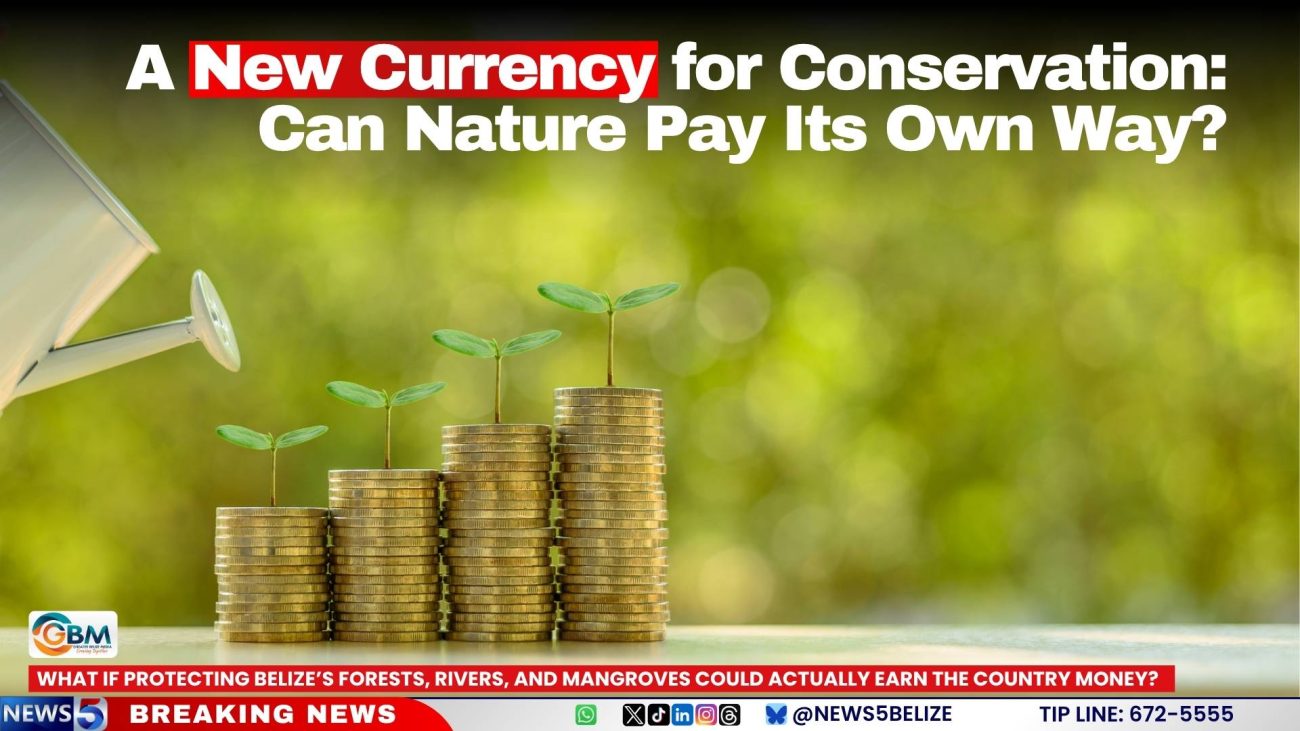A New Currency for Conservation: Can Nature Pay Its Own Way?
What if protecting Belize’s forests, rivers, and mangroves could actually earn the country money? That is one of the biggest ideas behind the proposed Climate Change and Carbon Market Initiative Bill, 2025. It is a new law that aims to turn conservation into a national asset while setting strict rules for how carbon trading will work.
The proposed Bill outlines how Belize could trade carbon credits, which are units that represent a tonne of greenhouse gas removed or reduced from the atmosphere, on the international market.
It promises a framework where both the environment and the economy can benefit. It also raises questions about how transparent and fair the system can be.
The Bill states its purpose is “to develop, implement, manage, and regulate mechanisms to enhance climate resilience and low emission development for the sustainable development of Belize.” It aligns with the Paris Agreement and the United Nations Framework Convention on Climate Change.

A New Currency for Conservation: Can Nature Pay Its Own Way?
What does this Bill actually create?
At its core, the law proposes the establishment of two major bodies.
The Belize National Climate Change Council will guide strategy and approve major climate projects. It will include senior government officials, a private sector representative, and a member from a non-governmental organisation.
Its role, according to the Bill, is “to encourage and foster national inter-ministerial coordination on climate change matters in Belize” and to “advise on and facilitate the revision and approval of carbon reduction or removal projects, project concepts, and proposals for the implementation of adaptation and mitigation actions for any projects.” Other functions and duties include:
- Guide national climate policies, strategies, and action plans for sustainable development.
- Create working groups to support its climate functions.
- Set eligibility criteria for carbon reduction or removal projects.
- Approve standards and formulas for calculating carbon credits.
- Develop approval processes for major national climate projects.
- Monitor and evaluate national systems that track emissions and mitigation results.
- Carry out duties under the UNFCCC and the Paris Agreement.
- Advise the second major body in this bill, the Climate Change Department, on national climate goals and targets.
- Offer guidance on any other related climate change matters.
The second major body in this bill is a new Climate Change Department, which will act as the implementing arm. It will “lead the development and implementation of the Nationally Determined Contribution” in collaboration with government, civil society, and Indigenous communities. and “coordinate the formulation of all climate change-related policies, strategies, and plans.”
It will also manage Belize’s National Registry System, a database tracking emissions, carbon credits, and approved projects. Some other functions under the department include:
- Representing Belize in international climate negotiations and forums under the UNFCCC, Kyoto Protocol, and Paris Agreement,
- Working with the Ministry of Finance to define revenue-sharing and taxation systems for carbon credits.
- Integrate climate resilience into national budgets and development planning.
- Develop a Resiliency Building Action Plan every five years and submit it for Cabinet approval.

A New Currency for Conservation: Can Nature Pay Its Own Way?
How will Belize’s carbon market work?
The Bill introduces a regulated carbon trading market, where carbon credits are treated as intangible commodities that belong to developers or landholders once registered. Each credit represents one tonne of carbon dioxide reduced or removed from the atmosphere.
Only authorised persons can trade these credits. Anyone wishing to sell or trade carbon credits must apply for a carbon credit authorisation permit. Selling credits without approval could lead to fines up to $20,000.
Every transaction must reflect a real and measurable reduction in emissions. The legislation also sets out strong safeguards to prevent “double counting”, where a single carbon reduction is claimed more than once. Violators face fines or imprisonment of up to five years.
Who approves climate projects?
Before a project can begin, it must have the “free, prior, and informed consent of all landholders whose land is proposed to be used.” The Department will issue approval letters for projects and require annual reporting on their income and performance.
The Council then decides whether to approve it within sixty days. If approved, both sides must sign a Carbon Reduction or Removal Project Agreement.
Projects must also show how landholders benefit, whether through money or other forms of compensation.
Where will the money go?
When the Government participates in selling carbon credits internationally, all revenue will be placed in the Consolidated Revenue Fund. However, the Bill says landholders may be compensated under a benefit-sharing plan approved by the Ministry of Finance.
It also gives the Climate Change Department power to coordinate with the Ministry of Finance on “shared benefits for carbon credits that hold monetary value via taxation pathways and strategic financial reporting requirements.”

A New Currency for Conservation: Can Nature Pay Its Own Way?
How will accountability be ensured?
The Bill outlines the role of the National Registry System, which will record every carbon project and credit. It will serve as the official database for monitoring Belize’s carbon market. A National Transparency Unit will also verify data and maintain a greenhouse gas inventory every two years.
The Bill gives officers authority to conduct inspections without prior notice. It makes it an offence to obstruct, tamper with, or falsify information. Each offence carries fines up to $20,000, and in some cases, imprisonment.
What happens to existing carbon projects?
The Bill recognises ongoing carbon reduction projects as “grandfathered projects”. These must register with the Climate Change Department within six months once the law takes effect and disclose project details, including sales, land size, and methodologies used.
Why does this matter for Belize?
If passed, the Act will make Belize one of the few Caribbean countries with a fully legislated carbon trading system. It aims to position Belize to benefit financially from conservation and reforestation projects while meeting its international climate commitments and protecting the rights of communities who live among them.
For a small nation vulnerable to climate change and a national debt just above four billion dollars, the question is whether this new market can bring real income and resilience. The Bill’s goal is to make Belize “a low-emission and climate-resilient country” that benefits from its already existing rich nature rather than exploiting it.






Facebook Comments